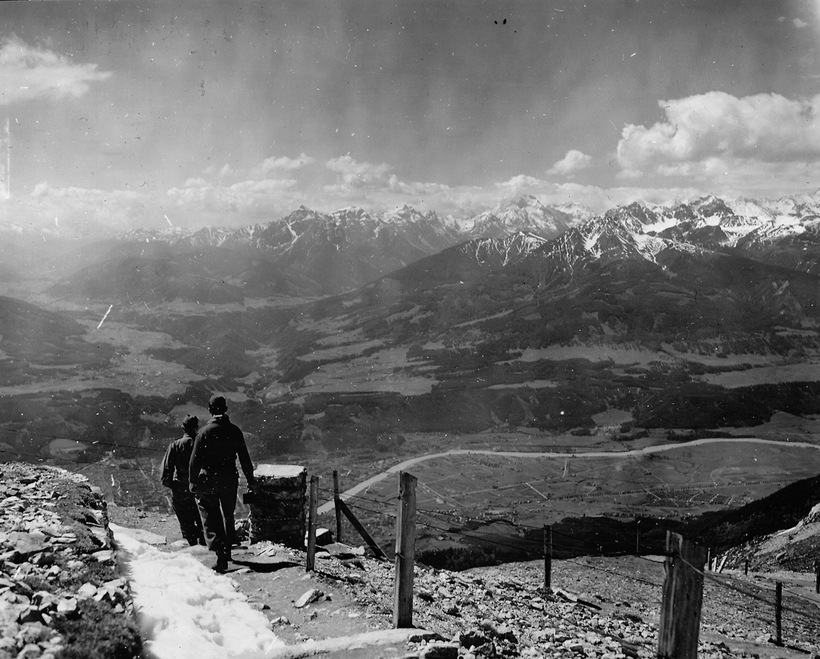In May of 1933, two months into his presidency, Franklin D. Roosevelt sent an appeal for world peace to 54 heads of state. In the wake of Adolf Hitler’s ascent in Germany, Roosevelt proposed that Europe’s rival powers pursue disarmament and sign non-aggression pacts with each other. “I think I have averted a war,” F.D.R. told one adviser. “Sending that message to Hitler had a good effect.” Some of the president’s supporters were less sanguine. Not only had Roosevelt effectively called for accommodation with Hitler, but his administration was also refusing to admit more Jewish refugees fleeing Nazi persecution. “He has saved Germany from France. He has saved the world from war,” said Rabbi Stephen Wise, the country’s most influential Jewish leader. “In heaven’s name, why can’t he be moved to save the Jews of Germany?”
During Roosevelt’s first term, some two-thirds of the roughly 97,000 Germans (many of them Jews) who sought to immigrate to the U.S. were denied entry. Not until after F.D.R.’s re-election in 1936 did America’s doors begin to creak open. About 11,000 German refugees were admitted the next year. “It was only a tiny fraction of those seeking to escape,” Eric Lichtblau writes in his brisk, Netflix-ready new book, Return to the Reich, “but it was something.” Lichtblau’s narrative traces the arc of one of the lucky ones, Friedrich “Freddy” Mayer, a strapping 16-year-old who arrived in the U.S. in 1938 and became, as West Virginia senator Jay Rockefeller said more than 70 years later, “one of the great unsung heroes of World War II.”
Hero’s Ascent
Even by the high standard for wartime adventure stories set by the likes of Louis Zamperini (as told by Laura Hillenbrand in Unbroken), Mayer’s is remarkable. After settling in Flatbush, Brooklyn, Mayer finds work as a car mechanic before trying to enlist in the army in 1941. Initially rejected due to the military’s suspicion of “enemy aliens,” Freddy negotiates with the army and soon gains attention for his “grit and tenacity,” as well as his German fluency. He is chosen to be one of only a few dozen Jewish refugees in the Office of Strategic Services, the espionage agency run by General “Wild Bill” Donovan.

The O.S.S. sends Mayer to Europe in 1944 to run sabotage operations in Austria. With Allied forces converging on Germany, U.S. leaders feared that Hitler might retreat to his Alpine fortress and make a last stand there. The region Mayer’s team infiltrates is “fervently pro-Nazi…. If anyone at all was there on the ground to greet them, it would most likely be Gestapo men with rifles drawn and execution orders set on the spot.” Freddy’s assignment is to gather intelligence to help Allied bombers destroy the Nazis’ rail network and cut off shipments of supplies to the front lines.
“[F.D.R.] has saved Germany from France. He has saved the world from war. In heaven’s name, why can’t he be moved to save the Jews of Germany?”
To say that the mission was carried out successfully does not betray the unforeseen twists in the plot, nor does it adequately convey the white-knuckle tension of Mayer’s face-to-face encounters with his enemies. Lichtblau imbues Freddy’s action sequences with satisfying, propulsive energy, while occasionally widening his focus to a cast of supporting characters, notably Mayer’s O.S.S. companion Hans Wynberg, another Jewish refugee, whose family remained trapped in Nazi-occupied Holland. What’s missing from Lichtblau’s otherwise deeply reported account is a stronger sense of the motivations and inner lives of these young men, who dropped behind enemy lines, adopted new identities, and risked everything on behalf of a country, America, they still barely knew.

“This is our war more than yours,” Freddy snaps when one of his O.S.S. bosses, an Ivy League–educated navy lieutenant, lectures him on the dangers that Freddy, as a Jew, would face in Nazi territory. Who did he believe he was fighting for? Mayer, who died in 2016, later said that he was simply repaying the debt he owed to the U.S., for providing Europe’s Jews with a haven from annihilation. But it seems just as plausible that this band of refugee fighters had an awareness that American leaders such as Roosevelt only belatedly grasped: that “what is happening in Germany is essentially no more the concern of Jews than it is of Gentiles. The interests that are at stake are not narrower than those of ‘civilization,’” in the words of Felix Frankfurter.
With the current U.S. administration intent on narrowing the definition of who can count themselves as American, it’s worth recalling, and celebrating, how immigrants like Freddy Mayer once helped the United States save civilization. Who knows when we might have to do it again?
Romesh Ratnesar is a writer for Bloomberg Opinion and a New America fellow. He is at work on a book about the end of World War II


